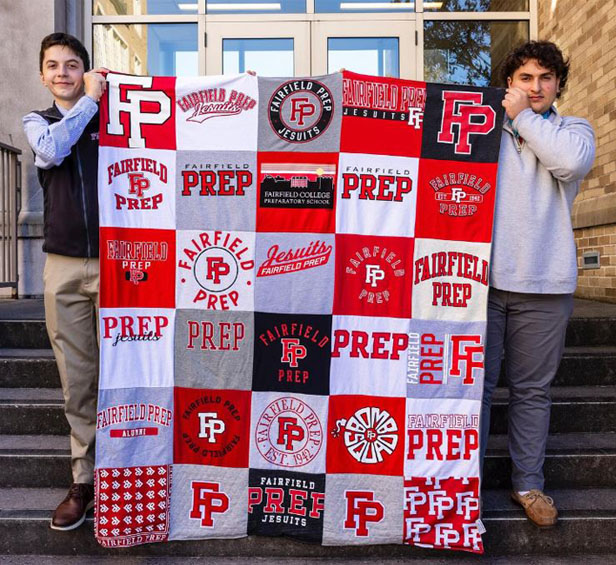Sustainability January 17, 2024
This Company Turns Old Tees Into Cherished, Sustainable Keepsakes
Project Repat creates USA-made T-shirt quilts, a sustainable product with applications in promo.
So often, a T-shirt is more than just a T-shirt. It’s a wearable reminder of where a person’s been and what they’ve accomplished. And parting with these tangible pieces of the past can be difficult (not just because many charities won’t accept logoed tees).
That’s where Project Repat comes in. The company turns the tees you no longer wear, but can’t bear to part with, into high-quality but affordable fleece-backed quilts – cut and sewn at Opportunity Threads, a worker-owned facility in Morganton, NC.
“The goal was to take this from a very niche product where your great aunt makes you this beautiful quilt that takes like 1,000 hours and turn it into something that everybody does when they graduate from high school and college,” says Ross Lohr, co-founder and CEO of Project Repat.

Project Repat turns old T-shirts into affordable, fleece-backed quilts.
The idea for the company began more than a decade ago when Lohr was doing education work in east Africa and would see people there sporting discarded U.S. school and event shirts – once even spotting a Kenyan fruit and vegetable seller with a tee proudly proclaiming that he’d danced his ass off at “Josh’s bar mitzvah.”
“I don’t think people understand the global economy that takes place where when you donate clothing to the Goodwill and other textile recyclers,” Lohr says. “The vast majority of those shirts end up for sale to middlemen who transfer them overseas.”
Initially, Project Repat would take some of those American tees being sold in Africa and have local artisans upcycle them into bags and scarves, which Lohr would the bring back to the U.S. to sell, using the proceeds as a fundraising mechanism for other nonprofits. The idea was to “repatriate” the old tees into the states.
However, the mission morphed once Lohr realized how many people in America had closets full of tees they wanted remade into something new. Creating USA-made T-shirt quilts also served the dual purpose of minimizing textile waste and cutting down on carbon emissions associated with transporting shirts from the U.S. to Africa and back again.
Project Repat has had a lot of success with its model – selling more than 1 million T-shirt quilts so far. The product has promo applications too: Brands will sometimes ask Project Repat to take their surplus logoed merch and turn it into keepsake quilts that can be hung up around the office or distributed as gifts to employees, Lohr says.
“That’s absolutely an angle we’ve approached and had a lot of success with,” he adds.
Ethix Merch (asi/189731) has been working with Project Repat to bring its products to clients, with one university looking at turning backstock inventory into T-shirt quilts, says Daniel Cardozo, president and CEO of Ethix and a member of the Promo for the Planet advisory board.
“It seems like a really natural opportunity to reduce textile waste by having bookstores pull that inventory, send it over to Project Repat and then they can turn them into salable items,” Cardozo adds.
In addition to the environmental angle, the fact that the quilts are made in an employee-owned factory with strong worker protections is also a huge part of the appeal, he notes, particularly for the university clients Ethix Merch often works with.
“That kind of factory is actually perfect for our business because they really, really care about the product they’re making,” Lohr says of its manufacturing partner Opportunity Threads. “A T-shirt quilt is a product where you can’t mess anything up. You only have one chance at getting it right.”
In addition to quilts, Project Repat has also started offering so-called “scrappy socks,” made from the parts of the T-shirt that aren’t used in its quilts.
View this post on Instagram
“The problem for our business has always been that we just use a 12-by-12 square of every shirt, and so we have the sleeves and the bottom part of the shirt left,” Lohr says. “We’ve never wanted those items to end up in landfills.”
Project Repat worked with Material Return, a circular manufacturing company in North Carolina, to take its post-consumer fabric scraps and combine it with other materials left on the cutting room floor, shredding them down and re-spinning them into yarn to make comfy socks – a cozy product Lohr says pairs nicely with its signature quilts. (North Carolina has become a hub for such sustainable textile innovation.)
“Quilts are always going to be the bedrock of our business,” Lohr says. “But we’d like to see how far we can push” into other products – like its socks – made from recycled materials.

Promo for the Planet is your destination for the latest news, biggest trends and best ideas to help build a more sustainable and socially-responsible industry.
